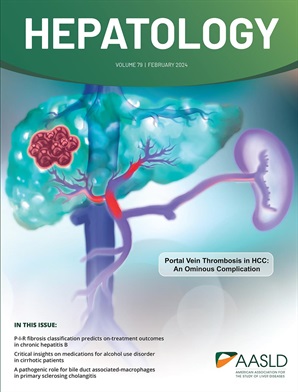HNF4α-CDKL3轴通过非经典磷酸化作用靶向FoxO1,从而限制MASLD的进展
IF 12.9
1区 医学
Q1 GASTROENTEROLOGY & HEPATOLOGY
引用次数: 0
摘要
背景和目的:代谢功能障碍相关性脂肪性肝病(MASLD)是一种症状广泛的世界性疾病。虽然早期症状轻微,但进一步发展会导致脂肪性肝炎、肝硬化、肝癌和糖尿病。发现 MASLD 进展过程中的关键调控因子对基础医学和转化医学都具有重要价值。方法和结果:在此,我们发现类环蛋白依赖性激酶 3(CDKL3)是阻止 MASLD 进展的主要监护因子。肝脏特异性 Cdkl3 消融的小鼠会出现严重的 MASLD 相关肝脏炎症、纤维化和糖尿病。从机理上讲,CDKL3可在一个非常规位点上直接磷酸化FoxO1,使FoxO1泛素化依赖性降解,从而显著缓解糖原和脂质积累,从根本上防止MASLD进入更高的阶段。此外,肝 CDKL3 是 HNF4α 的直接靶基因。HNF4α在MASLD期间受到抑制,导致CDKL3表达减少。因此,CDKL3 介导的 HNF4α 和 FoxO1 的相互影响在 MASLD 的进展过程中形成了一个反馈回路。结论:我们发现了HNF4α-CDKL3轴对FoxO1的另一种关键调控途径。CDKL3是MASLD的守护者,也可作为FoxO1抑制剂治疗MASLD的预后指标。本文章由计算机程序翻译,如有差异,请以英文原文为准。
HNF4α-CDKL3 axis restricts MASLD progression by targeting FoxO1 via non-canonical phosphorylation
Background and Aims: Metabolic dysfunction-associated steatotic liver disease (MASLD) is a worldwide disease with a broad spectrum of symptoms. Though being mild at early stages, further development of MASLD causes steatohepatitis, cirrhosis, liver cancers and accompanied diabetes. Discovery of the critical regulators in MASLD progression hold great values in both basic and translational medicine. Approach and Results: Herein, we identified Cyclin-dependent kinase like 3 (CDKL3) as a primary guardian against MASLD progression. Mice with liver-specific Cdkl3 ablation developed severe MASLD-related hepatic inflammation, fibrosis and diabetes. Mechanism-wise, CDKL3 directly phosphorylates FoxO1 on an unconventional site for the ubiquitination-dependent degradation of FoxO1, thereby remarkably alleviating glycogen and lipid accumulation and essentially preventing the onset of higher MASLD stages. Moreover, hepatic CDKL3 is a direct target gene of HNF4α. HNF4α is inhibited during MASLD, which led to diminished CDKL3 expression. The CDKL3-mediated crosstalk of HNF4α and FoxO1 hence forms a feedback loop in MASLD progression. Conclusions: We unearthed an alternative but critical regulatory path of FoxO1 by HNF4α-CDKL3 axis. CDKL3 serves as a guardian against MASLD and also may function as a prognosis indicator of FoxO1 inhibitor in MASLD treatment.
求助全文
通过发布文献求助,成功后即可免费获取论文全文。
去求助
来源期刊

Hepatology
医学-胃肠肝病学
CiteScore
27.50
自引率
3.70%
发文量
609
审稿时长
1 months
期刊介绍:
HEPATOLOGY is recognized as the leading publication in the field of liver disease. It features original, peer-reviewed articles covering various aspects of liver structure, function, and disease. The journal's distinguished Editorial Board carefully selects the best articles each month, focusing on topics including immunology, chronic hepatitis, viral hepatitis, cirrhosis, genetic and metabolic liver diseases, liver cancer, and drug metabolism.
 求助内容:
求助内容: 应助结果提醒方式:
应助结果提醒方式:


